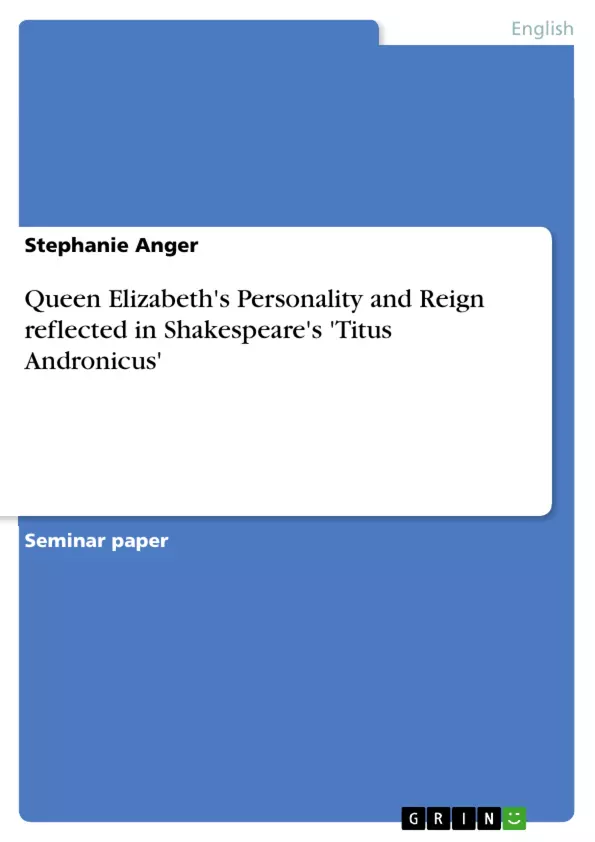There are about 2.800 books and about 47.000.000 web pages to be found today discussing Shakespeare’s life and his works. In this literary and historical jungle it is extremely difficult to find a topic that has not been dissected, discussed and academically proliferated upon ad anfinitum. Nevertheless, today’s inquisitive reader is still asking the same questions that have been asked over generations. One of these is for example. “Was William Shakespeare only an excellent and renowned Elizabethan playwright out to entertain a public yearning for the latest sensationalist entertainment? Or is there a hidden, more subtle, political voice to be interpreted when listening to or reading his words”? This essay will attempt to analyse the possible social, political inferences in Shakespeare’s Titus Andronicus with regard to Queen Elizabeth the monarch and Elizabeth the woman. Furthermore, this essay will compare various contemporary political authors with the statements being made in the playwrights work.
Table of Contents
- 1 Introduction
- 2 Shakespeare - a Political Voice in Elizabethan Society?
- 3 Detectable Aspects of Elizabeth's persona politica in Titus Andronicus
- 3.1 An Unwelcome Woman on the Throne
- 3.1.1 Elizabeth's Reign – a Threat to the Natural Order
- 3.1.3 Tamora's Rise and Exploitation of Status
- 3.2 Detraction of Primogeniture
- 3.2.1 Christopher Goodman and Jean Bodin - Examples of Strong Opposition to Primogeniture in Elizabeth's England
- 3.2.2 The Fatal, Personal and Political Consequences of Saturnius' Rise to Power
- 4 Elizabeth's persona privata Reflected in the Characters Depicted in Titus Andronicus
- 4.1 Comparisons Between Lavinia and Elizabeth
- 4.1.1 Silent Omnipresence and Dependency Upon Men
- 4.1.1.1 Young Elizabeth fails to be Autonomous
- 4.1.1.2 Lavinia's Suffer and Forbearance
- 4.1.2 To Marry or not to Marry - that is the Question or Marriage as a Must - Patriarchal Pressures
- 4.1.2.1 Elizabeth's Predicament
- 4.1.2.2 Lavinia's Deadly Solution
- 4.2 Raising the Finger of Morality: Parallels Between Elizabeth and Tamora
- 4.2.1 Elizabeth's Quick Temper
- 4.2.2 Elizabeth's Game with Dudley and her Other Suitors
- 4.2.2 Demonized and Passionate Tamora
- 4.3 The Perils of Queens Bearing Illegitimate Children - Similarities
Objectives and Key Themes
This essay analyzes the potential social and political implications within Shakespeare's Titus Andronicus, specifically examining its reflection of Queen Elizabeth I's personality and reign. It compares the play's themes with the writings of contemporary political authors to explore the extent to which Shakespeare's work engages with the political landscape of Elizabethan England.
- The portrayal of a female monarch and its societal implications.
- The exploration of power dynamics and political intrigue.
- The examination of legitimacy of rule and the challenges faced by female leaders.
- A comparison of Shakespeare's perspective with contemporary political thought.
- The use of character parallels to illuminate historical contexts.
Chapter Summaries
Chapter 1: Introduction introduces the essay's objective: to investigate the political undertones in Titus Andronicus as they relate to Queen Elizabeth I. It acknowledges the vast existing scholarship on Shakespeare while establishing the essay's unique focus.
Chapter 2: Shakespeare - a Political Voice in Elizabethan Society? explores the debate surrounding Shakespeare's political engagement. It discusses different interpretations of his works and contrasts his approach with that of Machiavelli.
Chapter 3: Detectable Aspects of The Queen's persona politica in Titus Andronicus begins the analysis of Elizabeth's reign as reflected in the play. Section 3.1 examines the challenges faced by a female ruler, contrasting Elizabeth's experiences with those of Tamora. Section 3.2 delves into the theme of primogeniture and its political consequences.
Chapter 4: Elizabeth's persona privata Reflected in the Characters Depicted in Titus Andronicus continues the analysis by focusing on the private aspects of Elizabeth's life and personality, comparing her with Lavinia and Tamora to reveal parallels in their experiences and challenges.
Keywords
Queen Elizabeth I, Titus Andronicus, Shakespeare, Elizabethan politics, female monarch, political intrigue, primogeniture, power dynamics, Machiavelli, gender roles.
Frequently Asked Questions
Does Shakespeare's 'Titus Andronicus' reflect the reign of Queen Elizabeth I?
Yes, the essay analyzes social and political inferences in the play regarding Queen Elizabeth's personality and her role as a female monarch.
Which characters in the play are compared to the Queen?
The analysis focuses on parallels between Queen Elizabeth and characters like Lavinia (private persona) and Tamora (political persona).
What political themes are explored in the context of Elizabethan society?
Key themes include the challenges of a female ruler, primogeniture, political intrigue, and the legitimacy of power.
Who are the contemporary political authors compared in this essay?
The essay references thinkers like Machiavelli, Jean Bodin, and Christopher Goodman to contextualize the play's political statements.
Was Shakespeare considered a 'political voice' in his time?
The work discusses whether Shakespeare's plays contained subtle political critiques or were merely intended for sensationalist entertainment.
- Quote paper
- Stephanie Anger (Author), 2008, Queen Elizabeth's Personality and Reign reflected in Shakespeare's 'Titus Andronicus', Munich, GRIN Verlag, https://www.grin.com/document/123409



